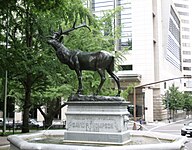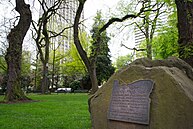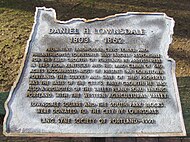| Lownsdale Square & Chapman Square | |
|---|---|
 Lownsdale Square Lownsdale Square | |
| Location | Portland, Oregon, United States |
| Coordinates | 45°30′57″N 122°40′39″W / 45.515721°N 122.677485°W / 45.515721; -122.677485 |
The Plaza Blocks, two courthouse squares known as Chapman Square and Lownsdale Square, are located in downtown Portland, Oregon, United States. The blocks, as well as the adjacent Terry Schrunk Plaza, are surrounded by multiple government buildings including City Hall, the Green - Wyatt Federal Building, the Portland Building, the Multnomah County Justice Center, the Hatfield United States Courthouse, and the old Multnomah County Courthouse.
History

The northernmost square is named after Daniel H. Lownsdale (1803—1862), a native Kentuckian who settled in Portland in 1845. The south square is named after legislator William W. Chapman (1808–1892), a Virginian who settled in Portland in 1850. Both Lownsdale and Chapman were some of Portland's first landowners.
The blocks were initially segregated by gender. Lownsdale Square for men and Chapman Square for women. Public speakers and preachers used the parks for their speeches. By 1900, Lownsdale Square was a gay cruising destination, allowing a degree of deniability. This activity also took place in Chapman Square by the 1950s. Evidence of the gender segregation still exists to some extent. The public men's and women's restrooms are still located in their respective blocks, and the monuments in each respective square are focused more on traditionally male vs female interests.
The first electric power transmission line in North America terminated at Chapman Square. It went online at 10:00 pm on June 3, 1889, operating at 4,000 volts of direct current, with the lines between the electric generating station at Willamette Falls in Oregon City, Oregon, and downtown Portland stretching about 13 miles. A bronze tablet in the park commemorates this achievement.
The Plaza Blocks, as well as the adjacent Terry Schrunk Plaza, are frequent hotspots for protests and civil unrest. Many people participating in the 2011 Occupy Portland protests used the parks to camp in. The 2020 George Floyd protests were centered on the parks and caused significant damage to the memorials and features of the park. The damage led to the removal of the Thompson Elk Fountain and The Promised Land. The Elk Fountain is set to be replaced in 2024.
Monuments
| Name | Memorial or Monument to | Date installed/built | Sculpted/built by | Notes |
|---|---|---|---|---|
| Thompson Elk Fountain | 1900 | Roland Hinton Perry | Donated by Mayor David P. Thompson.
The statue was removed after the base was damaged by a fire cause by protestors during the 2020 George Floyd protests. It is set to be replaced in 2024. | |
| Spanish–American War Soldier's Monument | '2nd Oregon Volunteer Infantry Regiment', Spanish–American War | 1906 | Douglas Tilden | The base of the monument features 2 Howitzers used in the defense of Fort Sumter. One cannon faces north and the other south to symbolize that they were used by both Union and Confederate forces. |
| Fountain for Company H | Company H,
'2nd Oregon Volunteer Infantry Regiment', Spanish–American War and Philippine–American War |
1914 | John H. Beaver | |
| First High-Tension Power Line Plaque | 1962 | This plaque memorializes the first electric power transmission line in North America. The first transmission occurred at 10:00 pm on June 3, 1889.
Placed by the Lang Syne Society, a civic group known for placing plaques on historic figures and events. | ||
| William W. Chapman Plaque | William W. Chapman,
Legislator, Attorney, and Surveyor General of Oregon |
1991 | Placed by the Lang Syne Society, a civic group known for placing plaques on historic figures and events. | |
| Daniel H. Lownsdale Plaque | Daniel H. Lownsdale,
Legislator and Tanner |
1991 | Placed by the Lang Syne Society, a civic group known for placing plaques on historic figures and events. | |
| The Promised Land | Oregon Pioneers/Settlers | 1993 | David Manuel | The statue was removed after it was damaged by protestors during the 2020 George Floyd protests.
It is currently unknown if it will be replaced. |
Gallery
-
Lownsdale Square
-
Chapman Square
-
 One of the restroom buildings
One of the restroom buildings
-
 Lownsdale Square, 2011
Lownsdale Square, 2011
-
 Top of the Spanish-American War Soldier's Monument
Top of the Spanish-American War Soldier's Monument
-
 One of the Fort Sumter Howitzers on the base of the Spanish-American War Soldier's Monument
One of the Fort Sumter Howitzers on the base of the Spanish-American War Soldier's Monument
-
 Occupy Portland camp-in, 2011
Occupy Portland camp-in, 2011
-
 Occupy Portland camp-in, 2011
Occupy Portland camp-in, 2011
-
 Protest against the killing of George Floyd, 2020
Protest against the killing of George Floyd, 2020
See also
References
- Insiders' Guide® to Portland, Oregon, 7th Rachel Dresbeck - 0762774770 2011 - Page 227 "Chapman Square, the southern square, was donated to the city by early Portland attorney William Chapman, while Lownsdale Square was contributed by Daniel Lownsdale, who arrived in Portland in 1845.The squares were originally popular sites for public oratory and other gatherings. And they have a quaint history-at one time, the idea was that women would gather at Chapman Square, while the men would have Lownsdale to themselves. Lownsdale Square is the home of the Soldiers' Monument from 1906, a granite pillar supporting the likeness of an infantryman. This soldier represents Oregon's contribution to the first major force of American troops dispatched overseas, the Second Oregon United States Volunteer Infantry. "
- ^ "Lownsdale Square". Portland Parks & Recreation. Retrieved November 16, 2011.
- "Chapman Square". Portland Parks & Recreation. Retrieved November 16, 2011.
- Boag, Peter (2003). Same-Sex Affairs: Constructing and Controlling Homosexuality in the Pacific Northwest. Berkeley: University of California Press. p. 115. ISBN 0-520-24048-0.
- "50 days of protest in Portland. A violent police response. This is how we got here". opb. Retrieved 2024-02-06.
- ^ "Iconic, 120-year-old Portland elk statue removed after fire set during protest". KTVZ. Associated Press. 2020-07-03. Retrieved 2024-02-06.
- ^ "Will the Elk Statue return to its spot in downtown Portland?". KOIN.com. 2020-08-25. Retrieved 2024-02-06.
- ^ "Portland approves $1.5 million to reinstall Thompson Elk statue in downtown". opb. Retrieved 2024-02-06.




